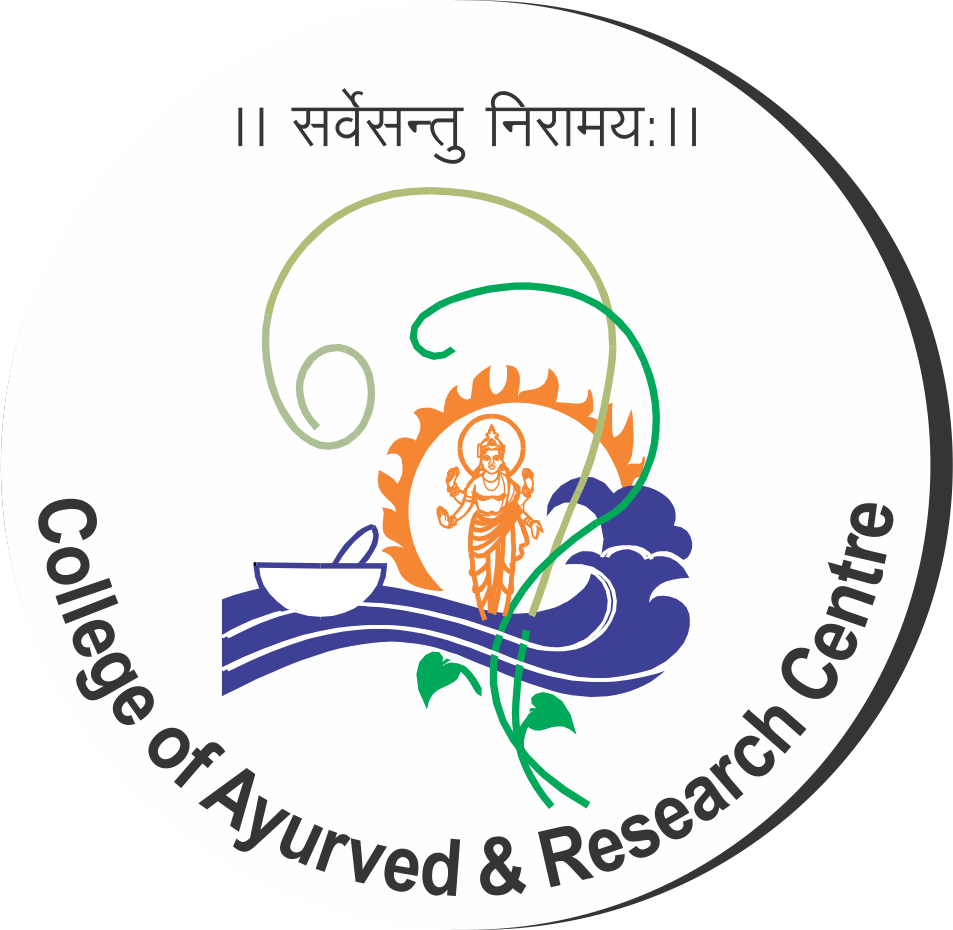Online Basic Course in Ayurveda & Yoga
For International Students
Courses conducted by
Pune District Education Association's, College of Ayurveda & Research Center
Nigdi, Pune 411044
(Maharashtra State-India)
Course Details:
| Course | Details |
|---|---|
| 1. Basic Course in Ayurveda | - |
| 2. Yoga for Health | - |
| 3.Medium of Instructions | English |
| 4.Faculties | Highly experienced postgraduate faculties of our institution will take the lectures. |
| 5.Eligibility | Candidate who is keen to learn Ayurveda & Yoga |
| 6.Fee Structure |
|
| 7.Mode of Payment |
NEFT (Account Details - IDBI Bank, Branch-Nigdi, Pune, A/c. No. – 0087104000307925, IFSC-IBKL0000087, MICR-411259004) |
| 8.Duration of the Courses | 10 hours (5 Saturdays of the months below) |
| 9.Commencement of the Courses | February, June, September |
| 10.Email ID for Correspondence | carcinternationalcell@gmail.com |
Global Interest in Ayurveda
| Point | Details |
|---|---|
| Curiosity Worldwide | People around the world of every profession are becoming curious about our very own ancient Ayurveda for better health and lifestyle in a natural way. |
| Challenges in Learning Ayurveda | Due to reasons such as lack of time, visa problems, and financial constraints, people intending to learn Ayurveda cannot physically visit India. |
| Diverse Learners | Not only doctors but scientists, engineers, even homemakers want to learn the basics of Ayurveda for better health and life. |
| Online Course Initiative | PDEA's College of Ayurveda & Research Centre, Nigdi, Pune, India, has designed an online basic Ayurveda Course for people worldwide interested in learning Ayurveda. |
| Noble Intention | Our intention to start the Online Ayurveda course is very noble because this type of course will definitely help to receive global acclamation for Ayurveda. |
Ayurvedic Principles
| Point | Details |
|---|---|
| Meaning of Ayurveda | Ayurveda comprises of two words- Ayu (Life) & veda (Knowledge). Medicinal science which gives us knowledge of health and disease is Ayurveda. |
| Ancient Origins | Ayurveda is the most ancient medicinal science, existing on the earth since 2500 B.C. Ayurvedic literature is scripted in Sanskrit Language which our eminent faculty has decoded it in very simple English language for our international students. |
| Science of Life | More than medicinal science, Ayurveda is the science of life which encompasses health, diseases, therapeutics, code of conduct, daily & seasonal regime, dietetics and spiritual base for better living. |
| Divine Origin | Ayurveda has a divine origin and it is evolved from the nature. Ayurvedic principles comprise panchamahabhuta (5 great elements), Tridosha, Dhatu & Mala. Ayurveda defines health in the most appropriate way and emphasizes on balance among Dosha-Dhatu-Mala, Mind and Soul. |
| Self-Knowledge with Ayurveda | With Ayurveda, you learn to know yourself - your constitution (Prakruti), so that you can select the correct food, herbs and exercises and lifestyle with which you can maintain health and prevent diseases. |
| Global Interest | Every person all over the globe, especially after the COVID-19 pandemic, is eager to know & learn about Ayurveda & yoga. |
Changes Ayurveda & Yoga Can Bring Within You
- If you learn and follow the principles of Ayurveda & Yoga, you will be happier, healthier, and spiritually balanced.
- Basic course of Ayurveda provides a clear understanding of the fundamental principles of Ayurveda including basic body constituents – Dosha, Dhatu, and Mala with which you can modulate your diet & lifestyle and stay healthy.
Outstanding Features
- Certified online "Basic course in Ayurveda" and Yoga are designed by PDEAs College of Ayurveda & Research centre (PDEAs CARC), Nigdi, Pune, (Maharashtra State, India).
- PDEAs CARC is recognized by AYUSH Ministry, NCISM, New Delhi, India.
- PDEAs CARC is affiliated with Maharashtra University of Health Sciences, Nashik, Maharashtra, India.
- We provide wide knowledge about Ayurveda & Yoga.
- Information about basic principles of Ayurveda and its application in daily life to maintain health and quality of life.
- Curriculum is designed by highly experienced faculties.
- PDEAs CARC (Recognized by AYUSH Ministry & Affiliated to Health University, Nashik, India) will confer a certificate after completion of the course.
- Very reasonable course fees.
How to Register for the Course:
- Select the course of your interest and fill in the details in the registration form.
- After registration, you will receive remittance/payment method details through email.
- Fill the form, attach a photograph, passport details along with full remittance.
Teaching Learning Method:
- Once your registration is complete, our faculty will take a 60-minute online lecture on Zoom.
- Modules and weekly assignments as per schedule will be sent via email.
- The student is supposed to send his or her doubts via email by Wednesday.
Method of Evaluation:
- Multiple-choice questionnaires will be provided at the end of each module, on the particular topic.
- Candidates are supposed to write down the answers to these questions and send them to the faculties for evaluation.
- The course will be complete after you send answers to questions on all 15 modules.
- No other examination is conducted.
Course Completion Certificate
Certificate of appreciation will be provided after completion of the course & examination.
I-Curriculum of the Online "Basic course in Ayurveda"
Modules of "Basic course in Ayurveda" -
Curriculum
Online "Basic course in Ayurveda"
| Module | Topic |
|---|---|
| 1 | History of Ayurveda |
| 2 | Basic Principles of Ayurveda |
| 3 | Concepts of Tridosha |
| 4 | Concept of Dhatu |
| 5 | Concept of Mala |
| 6 | Concept of Prakruti – Body Constitution |
| 7 | Ayurvedic Concept of Blood Circulation, Blood Pressure |
| 8 | Anatomy In Ayurveda |
| 9 | Ojus |
| 10 | Concept of Agni & Koshtha |
| 11 | Concept of Health in Ayurveda |
| 12 | Digestion & Metabolism |
| 13 | Different Channels – Srotasas |
| 14 | Ayurvedic Herbology – Six Rasas (Tastes), Virya (Potency), Vipaka (Post Digestive Effect) |
| 15 | Kitchen Pharmacy |
II-Curriculum of the Online Yoga for health Course Modules of Yoga Course Theory
| Module | Topic |
|---|---|
| 1 | Introduction to the Science of Yoga |
| 2 | Ayurveda-Yoga Relation |
| 3 | Eightfold Steps of Yoga (Ashtanga Yoga) & Its Importance |

